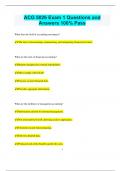NURS 2474 Rasmussen Pharmacology
Final Exam || Complete Questions &
Answers (100% Accurate)
Conceptial Researchers 2024 conceptialresearch@gmail.com
,NURS 2474 Rasmussen Pharmacology
Final Exam || Complete Questions &
Answers (100% Accurate)
Tiotropium - ANSWER - Anticholinergic, long acting inhaled agents for maintenance
therapy of bronchospasm associated with COPD, NOT approved for asthma,
relieves bronchospasms by blocking muscarinic receptors in the lungs
tiotropium(bronchodilator) therapeutic level timeframes - ANSWER - therapeutic
effects begin about 30 minutes after inhalation, peaks in 3 hours, and persists about
24 hours, Adherence is very important
Treatment principles of cold symptoms in children - ANSWER - One medication at a
time for one symptom at a time, NO combination drugs, if child has a cough, give
med that is only used to treat cough, avoid OTC cold remedies for children younger
than 4-6 years, only products with pediatric label, avoid antihistamines to sedate
children
Peptic Ulcer - ANSWER - Most common cause is H. pylori bacteria and second is
NSAIDs.
Antiulcer drugs - ANSWER - Antibiotics (eradicate H. pylori), antisecretory agents
(minimize secretion of gastric acid), mucosal protectant, antisecretory agent that
enhances mucosal defenses, antacids
Antacids: Pt Education - ANSWER - Antacids can reduce absorption of cimetidine:
should be administered at least 1 hr apart, prevent ulcers, interact with other meds
so consult doctor before taking
Cimetidine PT education - ANSWER - prevents GERD and prevent ulcers, if
cimetidine is taken with meals, absorption will be slowed and beneficial effects
prolonged
General GERD treatment principles - ANSWER - If pt is already taking histamine
antagonist, may add long term treatment of omeprazole (PPI), treat with drugs or
surgery (pepcid), 3 goals for treatment are relief of symptoms, promotion of healing,
prevention of complications
Proton Pump Inhibitors (PPIs) - ANSWER - most effective drugs for suppressing
secretion of gastric acid and preveting ulcers (prophylaxis), short term therapeutic
use
metered-dose inhaler (MDI) - ANSWER - handheld device delivering a measured
dose of a drug with each actuation
, Pt education on MDI - ANSWER - When 2 inhalations are needed, 1-minute interval
is needed in between each puff; The patient should take a bronchodilator before a
corticosteroid medication (B before C)
PT education on MDI - ANSWER - after inhaler use rinse mouth and gurgle,
espeically with glucocorticoids (steroid), can cause the steroid to be absorbed
through membrane
Long term treatments for asthma and COPD - ANSWER - Anti-inflammatory drugs,
corticosteroid, bronchodilators, drugs are taken daily for long term control,
glucocorticoids for long term prophylaxis (prednisone)
Short term treatments for asthma and COPD - ANSWER - Bronchodilators
(tiotropium), albuterol, provides symptomatic relief do NOT alter the underlying
disease process (inflammation)
Rescue inhaler respiratory drugs - ANSWER - Bronchodilator- albuterol, terbutaline
sulfate, effects start within minutes and last for 2-4 hours
Long term treatment respiratory drugs - ANSWER - Corticosteroids (glucocorticoids)-
Fluticasone, Budesonide, Prednisone
Bronchodilators- Montelukast, Zafirlukast
Treatment of acute asthma - ANSWER - Bronchodilators, SABAs, LABAs, nebulizer,
oxygen, IV glucocorticoids
Bronchodilators Action - ANSWER - activation of beta2 receptors in the smooth
muscle of the lungs, promotes bronchodilation, relieving bronchospasm
short acting beta 2 agonists (SABAs) - ANSWER - taken PRN to abort an ongoing
attack, provide quick relief of asthma symptoms. They can also be prescribed to be
taken before exercising in order to prevent exercise-induced bronchoconstriction.
Long Acting Beta2 Agonists (LABA) - ANSWER - Dosing on fixed schedule, long
term control of pts who experience frequent attacks, most often used as a
combination medicine, combined with an inhaled steroid. The LABA relaxes the
muscles around the airways in the lungs.
Glucocorticoids - ANSWER - long term treatment for asthma, most effective
antiasthma drugs, NOT a prn medication
Side effects of glucocorticoids - ANSWER - can slow growth in children/adolescents,
promotion of bone loss, increased risk for cataracts, increased risk for glaucoma
Inhaled use of Glucocorticoids - ANSWER - inhaled glucocorticoids are very effective
and much safer than systemic glucocorticoids
Adverse effects of inhaled use glucocorticoids - ANSWER - adrenal suppression,
oropharyngeal infection, dysphonia (rough voice changes)





